🚨 Organisation for Economic Co-operation and Development (OECD) Citation!!
We are thrilled to be cited in the PISA Results: The State of Learning and Equity in Education report!
The paper referenced above – Children’s Educational Outcomes and Persistence and Severity of Household Food Insecurity in India: Longitudinal Evidence from Young Lives – highlights the association between children’s educational outcomes and household food insecurity in the Global South. It discusses that children’s development and academic performance could improve if household food insecurity during childhood and adolescence is effectively addressed.
______________________________________________________________________
Food Security for Equitable Futures – Short Courses Series – Day 2 Session 3 – Dr Sutapa Agrawal
📽️ Dr Sutapa Agrawal in her session discussed nutrition paradox in India, based on the evidence collected from Comprehensive National Nutrition Survey (CNNS) and National Family Health Survey (NFHS) datasets.
Head to our YouTube channel for all videos in Short Courses Series!!
You can view Dr Agrawal’s full session here 👇
______________________________________________________________________
Our Newest Newsletter Is Here – Take a Look!!
You can find the full version of the newsletter#9 here, which includes the recap of what’s been happening over the past few months.
In this edition:
- Team submission published by the UK Parliament
- What’s new on our socials!!
- Walking through the field: Everyday joys and pain by Dr Swayamshree Mishra
- ‘Plastic’ rice for good health? by Dr Charumita Vasudev
- Managing care responsibilities amidst economic precarity by Dr Ankita Rathi
- Prof Fledderjohann presents findings at two conferences
- Talk by Dr Vasudev at Agriculture Nutrition and Health (ANH) conference
_______________________________________________________________________
Food Security for Equitable Futures – Short Courses Series – Day 2 Session 2 – Prof Dipa Sinha
📽️ Prof Sinha discussed that India’s food security and nutritional outcomes could not be understood without addressing country’s deep-rooted social, economic, and geographic inequalities. Hunger and malnutrition are not only problems about food availability, but the result of structural inequities that cut across caste, class, gender, and region.
You can find the full version of the talk here👇 Head to our YouTube channel for all other videos in Short Courses Series!!
_______________________________________________________________________
📢 UK Parliament Call for Evidence – PUBLISHED!!
Innovation and Global Food Security
Food Security for Equitable Futures team’s evidence to the UK Parliament has been published!
This evidence makes us question whether the use of technology is the solution to everything?? It emphasises that the policies have to be context-specific to increase the likelihood of adopting innovative and technology-oriented measures among marginalized communities.
You can read full article here.
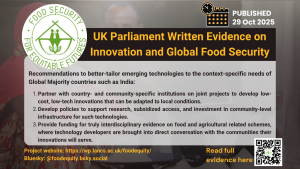
_______________________________________________________________________
📢 Dr Charumita Vasudev presented at the ANH conference
Promoting Just Transitions through Equity
The 10th Annual Conference of Agriculture Nutrition and Health (ANH) was held in Hybrid mode from 24-26 June 2025. Dr Charumita Vasudev presented the team’s joint paper titled “Food management in households and disruptive events: Lessons from Covid-19” in the oral session on ‘Diets and nutrition in conflict, protracted and/or humanitarian contexts’.
Key takeaways:
✔️How households managed food insecurity during Covid-19
✔️Factors that shaped resilience at the household level
✔️Coping strategies
✔️Undesirable Covid-era decisions impairing long-term future earning potential
_______________________________________________________________________
Food Security for Equitable Futures – Short Courses Series – Day 2 Session 1 – Mr Biraj Patnaik
📽️ Mr Biraj Patnaik opened his session by discussing the urgent issue of food and nutrition security in India. He drew from his extensive experience in policy building, activism, and social reform. He highlighted the evolution of food rights in India, the current challenges, and the vital role of civil society in safeguarding democratic processes and ensuring food justice.
Mr Patnaik emphasized on the message of careful optimism and a call for renewed commitment to food and nutrition rights. He encouraged the younger generation and civil society actors to persist in advocacy, legal action, and grassroots organizing to realize equitable access to nutritious food and to strengthen democratic governance.
______________________________________________________________________
Prof Fledderjohann presents online at Fed Up, the 15th Annual Food Studies Conference
📽️ In this video, Prof Fledderjohann shares findings from the interview data collected in India. Using her previous work articulating pathways between food insecurity and reproductive justice (paper available open access here), Prof Fledderjohann describes how food insecurity is restricting reproductive justice for women in India.
______________________________________________________________________
📢 UK Parliament Call for Evidence Submission
Based on the in-depth fieldwork and insights from evidence-rich data, Food Security for Equitable Futures team has submitted their take on the latest call for evidence on Innovation and Global Food Security to the UK Parliament.
The evidence highlights the importance of carefully considering socio-cultural contexts when thinking about innovation and its implementation. The marginalized communities are at the risk of being trapped in a recurring debt cycle which exacerbates economic vulnerability for low-income households, compounding food insecurity. It also talks about adverse effects on farm ecology hampering future yields, potentially threatening long-term food security.
You can read full article here.
_____________________________________________________________________
📍Food Security for Equitable Futures – Short Courses Series – Day 1 Session 5 – Mr V R Raman
✔️Mr Raman resumed the fifth session by reinforcing the importance of inclusivity in addressing food insecurity. He expanded on the need for participatory approaches and community engagement, emphasizing that solutions must be context-specific and locally driven. The discussion focused on the concept of “community”…
For more details and the full version of the talk, head to our YouTube channel👇
____________________________________________________________________
Food Security for Equitable Futures – Short Courses Series – Day 1 Session 4 – Mr V R Raman
Mr Raman highlighted in his session that food insecurity needed to be recognized not just as hunger, but as a complex issue tied to health, gender, governance, and human rights. Addressing it required stronger data systems, empathetic and inclusive governance, participatory approaches, and policies centred on equity. Whether as students or professionals, everyone has a role to play in bringing about a meaningful change through their communities, institutions, or careers.
His session is available to watch on our YouTube channel.

____________________________________________________________________
Food Security for Equitable Futures – Short Courses Series – Day 1 Session 3 – Prof Carlo Cafiero
The presentation by Prof Carlo Cafiero focused on what the term ‘food insecurity’ implies and explored the historical, methodological, and practical aspects of measuring food insecurity. Prof Cafiero also talked about the gradual advancement of experience-based food insecurity scales, their current applications, and future directions.
His session is available to watch on our YouTube channel.
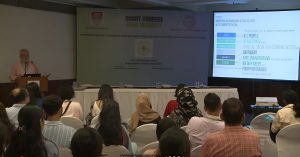
____________________________________________________________________
Project Newsletter Issue #8 Has Landed!!
This newsletter is packed with exciting news, fresh insights, big wins and team highlights you’ll love!
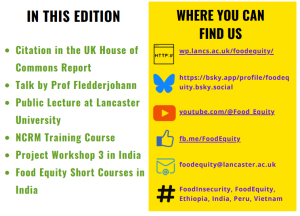
You can read the full version here: Project Newsletter 8 – May 2025
____________________________________________________________________
Food Security for Equitable Futures – Short Courses Series – Day 1 Session 2 – Prof Sukumar Vellakkal
Continuing with the discussion on food insecurity on the first day of the short courses programme, Prof Vellakkal’s session focused mainly on food inflation, and measures of food consumption and malnutrition. He also highlighted that rising food prices lead households to adopt consumption smoothing strategies like cutting consumption or switching to cheaper alternatives, which can further affect overall food security. Prof Vellakkal advocated for promotion of affordable, nutritious food by the state and increasing agricultural productivity.
For details, please head to our YouTube channel.
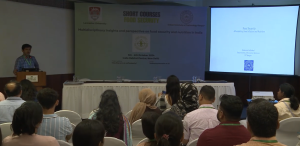
____________________________________________________________________
Food Security for Equitable Futures – Short Courses Series – Day 1 Session 1 – Prof Jasmine Fledderjohann
The short courses series kicked off with a welcome note from Prof Jasmine Fledderjohann. Her session gave a brief overview of food insecurity as a social problem and how it challenges the right to food. The details of her talk are summarized in the description section of the YouTube video and you can view the entire session on our YouTube channel here.
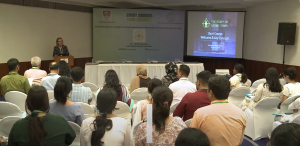
____________________________________________________________________
Event Highlights of Food Security for Equitable Futures Short Courses
This video gives some highlights from sessions with each of our speakers in the Food Security for Equitable Futures Short Course series held in Delhi, India in October 2024. It also includes reflections from the organisers and some participants. Full videos of the sessions will be uploaded to our YouTube channel in the coming weeks/months.
Stay tuned for more!!
____________________________________________________________________
Short Course Participant Experiences
In October 2024, our project team and key stakeholders co-designed and delivered a series of short courses focusing on food insecurity and nutrition challenges and prospects in India. This video provides a few highlights of participants’ experiences of the courses.
____________________________________________________________________
Our Project Introduction in Hindi Language
____________________________________________________________________
National Centre for Research Methods (NCRM) Training Course
Date: 16/07/2025 – 17/07/2025
Our project team – Dr Swayamshree Mishra, Dr Ankita Rathi, Dr Charumita Vasudev and Prof Jasmine Fledderjohann – are conducting an online training session on ‘Navigating Complexity: Qualitative Research in Challenging Field Settings’.
Anyone is welcome to take the course – please register here: https://www.ncrm.ac.uk/training/show.php?article=13917
____________________________________________________________________
Podcast – Learning to Sleep Hungry!!
Our very own project stakeholder and expert advisor, Mr Biraj Patnaik, talked about food equity with respect to climate change in a podcast organized by The Pentland Centre for Sustainability in Businessin their Transforming Tomorrow series.
To listen to the podcast, Leaning to Sleep Hungry by Biraj, click here.
____________________________________________________________________
Invited Talk at Indian Sociological Society (ISS) by Prof Fledderjohann
On 31st March, 2025, our own Prof Jasmine Fledderjohann delivered an invited lecture to the Ad Hoc Group 3: Food, Culture, & Society of the Indian Sociological Society, chaired by Dr Rituparna Patgiri. Prof Fledderjohann critiqued arguments that food insecurity is a problem of overpopulation and introduced a framework for viewing food insecurity as a matter of reproductive justice.
You can watch the full talk here: https://www.youtube.com/watch?v=Jl3VUPpw52c
Citation in the UK House of Commons Report!
We are thrilled!! Yet another incredible citation!
The evidence our team provided to the UK Government ‘call for evidence’ has been cited in a recent House of Commons report on The UK Government’s work on achieving SDG2: Zero Hunger. We are enormously grateful to our stakeholders and participants for sharing their time and experiences, and always for the opportunities to facilitate meaningful impact. You can read our submitted evidence here, and the full report here.
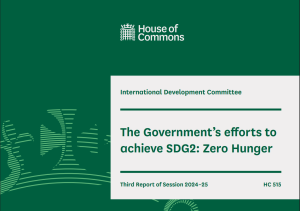
Public Lecture at Lancaster University by Biraj Patnaik
Food Security for Equitable Futures along with the Lancaster University Engagement Team invited Mr Biraj Patnaik, one of our key project stakeholders based in India, to give a talk entitled ’Our Food Futures: Rising Inequality and Climate Change‘ in a Public Lecture Series at Lancaster University.
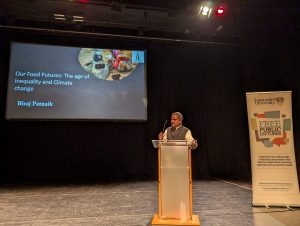
____________________________________________________________________
Short Courses – Food Security for Equitable Futures
Lancaster University in collaboration with IIT Kanpur has organized short courses for early career researchers and postgraduate students. It will include multidisciplinary insights and perspective from renowned experts on food security and nutrition in India.
Fully funded registration for all. Travel stipends available on need basis.
Click here for further details.
____________________________________________________________________
UK Parliamentary Networking Event
Saadia Shah, Project Impact & Engagement Lead, represented our Food Security for Equitable Futures project in a Parliamentary Networking Event on 22nd May 2024, which took place in the UK Parliament building (Portcullis House), London. It was a well-attended event joined by different units of the UK Parliament including MPs, UK Parliament’s Knowledge Exchange Unit, Parliament’s Senior Partnerships Officer, and academics, researchers, knowledge mobiliser and other experts in the field.
Saadia presented project work to key individuals to seek feedback on the policy engagement the project has been part of. She discussed future plans for policy engagement and explored different avenues to work with Parliament.
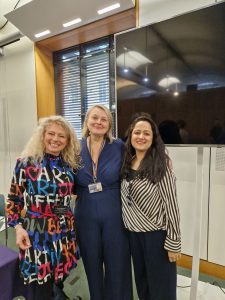
___________________________________________________________________
Latest episode of our Expert Interview Series with Prof Dipa Sinha is OUT!!
In this video, Dr Charumita Vasudev, qualitative postdoc on the project, interviews Prof Dipa Sinha on her work on food security and child malnutrition in India. Prof Dipa Sinha is an Assistant Professor of Economics at Ambedkar University, New Delhi. She has worked alongside the Office of Commissioners to the Indian Supreme Court, specifically focusing on the Right to Food, and remains actively engaged with the Right to Food Campaign in India. Her research focuses on public policy, gender, health, and nutrition.
___________________________________________________________________
Written Evidence on the UK Government’s work on achieving SDG2: Zero Hunger.
In October 2023, the UK Parliament’s International Development Committee called for written evidence on foreign, Commonwealth and Development Office (FCDO) and wider UK Government’s work on hunger and nutrition around the world and work towards achieving Zero Hunger by 2030 in line with SDG2. The evidence examined the impact on this work of significant ongoing cuts to the UK aid budget. Our project team responded, making recommendations to the committee, which was published on 23rd January 2024.
UK Gov Zero Hunger Call for Evidence_final
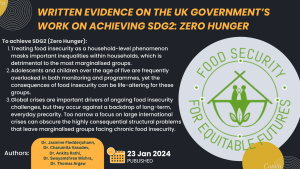
______________________________________________________________________
Symposium – The Politics and Practices of Reproductive Health, Rights and Justice
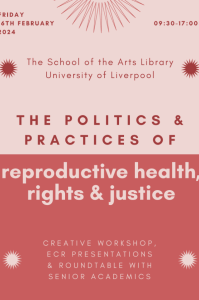
In spring 2023, the UK Parliament’s International Development Committee called for written evidence on whether aid money spent by the Foreign, Commonwealth and Development Office (FCDO) on sexual and reproductive health programmes in Global Majority countries could be targeted more effectively. The team responded making recommendations to the committee, which was published on 2nd May 2023.
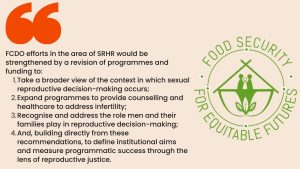
Virtual Annual Conference 2024: Crisis, Continuity and Change
Dr. Charumita Vasudev will be presenting a paper entitled – What a ‘Good Mother’ Eats : Food Choices, Sacrifices and the Politics of Provisioning. This paper discusses how socially constructed ideals of a ‘good mother’ affect women’s daily choices, preferences, planning for and allocation of food within the family.
_____________________________________________________________________
_____________________________________________________________________
6th issue of our Newsletter is out NOW!!
- Check out some thought-provoking stories from the field work in India around Food Insecurity
- Evidence submitted to the UK Parliament for sexual & reproductive health programmes
- Latest on Expert Interviews & many more..
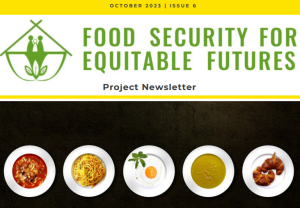
_____________________________________________________________________
Dr. Swayamshree Mishra’s talk at the University of Oxford
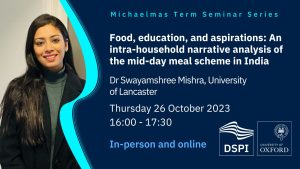
_____________________________________________________________________
Dr. Charumita Vasudev’s contribution to the news article in The Hindu
The research by Food Security for Equitable Futures project is making its mark globally. Well done Dr. Charumita Vasudev for your valuable input to The Hindu newspaper for the article ‘A ‘silent’ burden | Who cares for women living with diabetes?’
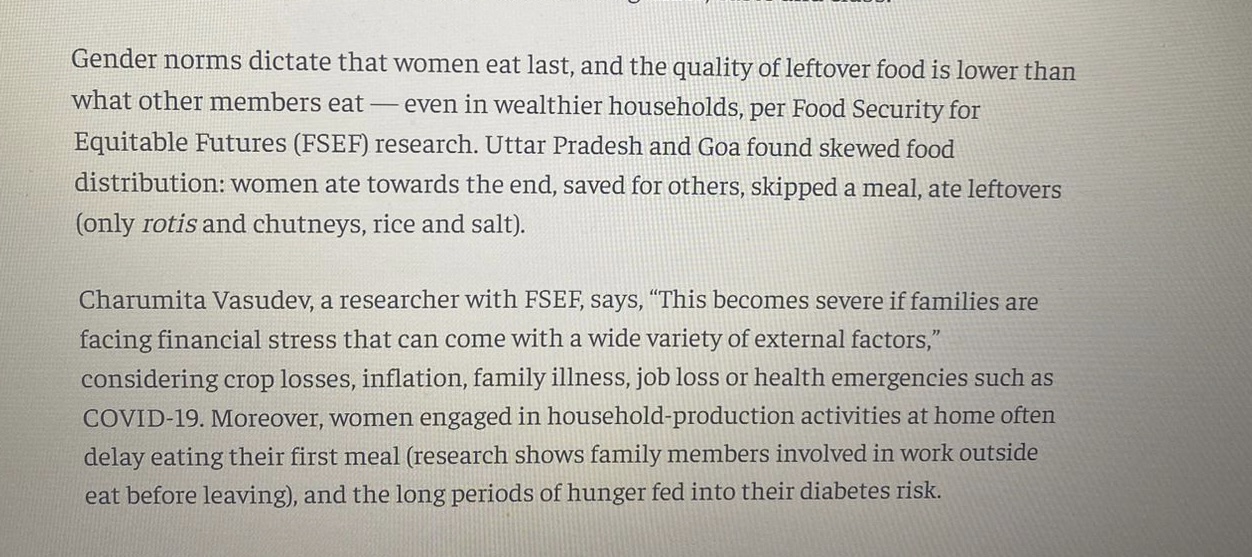
_____________________________________________________________________
_______________________________________________________________________
Press release!!
Hot out of press is the news item discussing the paper ‘Children’s Educational Outcomes and Persistence and Severity of Household Food Insecurity in India: Longitudinal Evidence from Young Lives‘, led by Dr. Thomas Argaw, and co-authored by Dr. Jasmine Fledderjohann, Dr. Elisabetta Aurino and Dr. Sukumar Vellakkal.
This paper adds to a small but growing literature exploring how household food insecurity is associated with children’s educational outcomes in the Global South. The team found that food insecurity is associated with fewer years of completed education and lower maths and vocabulary scores. More persistent and more severe food insecurity compounded the negative effects of household food insecurity on children’s learning outcomes. Addressing household food insecurity in childhood and adolescence may be a key factor to improve children’s educational outcomes.
The paper has generated interest among journalists and the general public. NutritionInsight also wrote a feature piece about the article, which included in-depth comments from Dr. Argaw. There are around 20 news and blog sites circulating this paper authored by our team.
_______________________________________________________________________
The latest issue of our Newsletter is out!
The fourth issue of our Newsletter provides updates on the research and engagement activities that our team has undertaken since March 2022, such as the team’s participation in the 117th Annual Meeting of the American Sociological Association. The Newsletter introduces our new team members, Drs Ankita Rathi, Charumita Vasudev, and Swayamshree Mishra, and also includes a list of recent publications that have come out of the project so far. The Newsletter can be downloaded here.
_______________________________________________________________________
New article in The Conversation: 8 billion people: why trying to control the population is often futile – and harmful
Alarmism about population growth has a long and chequered history. On one side are concerns that there are too many people, and that sheer numbers are causing our current environmental crisis. On the other side are arguments that we have too few people. Elon Musk has said that “population collapse due to low fertility rates is a much bigger risk to civilization than global warming”. And a recent column in the Sunday Times naively argued that the UK should “tax the childless” in order to address declining fertility rates. Our own Dr. Jasmine Fledderjohann in collaboration with Dr. Melanie Channon highlight the dangers population alarmism in their latest article for The Conversation. Read more here
_______________________________________________________________________
Job Opportunity: Qualitative Post-Doctoral Researcher (x1)
The post-doctoral fellow will report to the project’s India PI- Dr Sukumar Vellakkal, Department of Economic sciences, IIT Kanpur. The post-doctoral fellow will also collaborate with Dr Jasmine Fledderjohann (the lead PI at Lancaster University, UK) as well as with 2 qualitative post-doctoral fellows and 1 quantitative post-doctoral fellow from Lancaster University, UK. The candidate will join a team of quantitative, qualitative, and mixed-methods researchers to contribute to data collection in India and data analysis. For more see here
Application Deadline: 25th August 2022
_______________________________________________________________
Feeding the Future? Evidence on Food Insecurity in the UK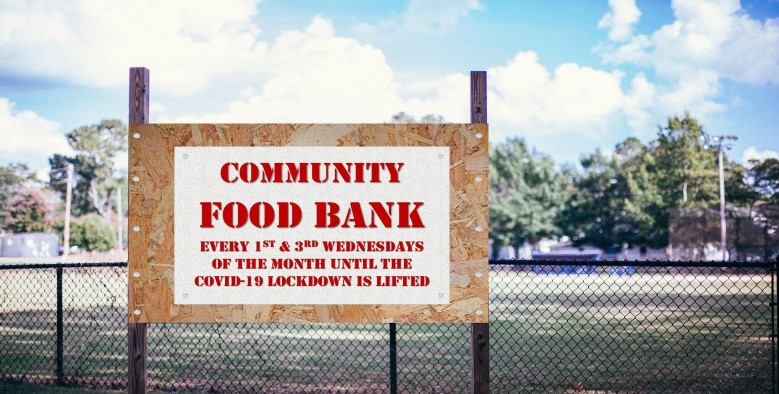
Although there is ample evidence that food insecurity is a long-term and pressing social problem in the UK, policy responses have been inadequate to ensure the right to food is being met for all. UK Government data show ~1-in-7 households faced food insecurity in 2019-2020, and in February 2022 around 1 million adults in the UK reported that, during the past month, someone in their household had to go a whole day without eating due to difficulties affording or accessing food. Marginalised groups, including households in receipt of Universal Credit, face disproportionately high risks of food insecurity. Austerity, Covid, poverty, and the climate crisis are all drivers of this pressing social problem. Food charities have sought to help food insecure households as best they can but, as this policy brief explains, charities are ultimately unable to fix the large-scale structural drivers of food insecurity. In order to address food insecurity in both the short-term and the long-term, urgent Government action is needed to scale up social protection and reduce carbon emissions. This includes, but is not limited to, removal of conditionalities and scaling up of Universal Credit and other income support programs.
A new policy brief, summarising the issues, can be found here: Food Insecurities Policy Brief
For further details, contact Dr Jasmine Fledderjohann (j.fledderjohann@lancaster.ac.uk).
_______________________________________________________________________
Job Opportunity: Qualitative Post-Doctoral Researcher (x2)
You will join a mixed-methods team to work on primary data collection in India and data analysis on Dr. Fledderjohann’s project, which focuses on food insecurity in India, Ethiopia, Vietnam, and Peru. In your first months on the project, you will work with Dr. Fledderjohann, project co-investigator Dr. Sukumar Vellakkal (IIT Kanpur), and two other qualitative postdocs to collect data on food insecurity and family life in Uttar Pradesh and Goa. For more see here

